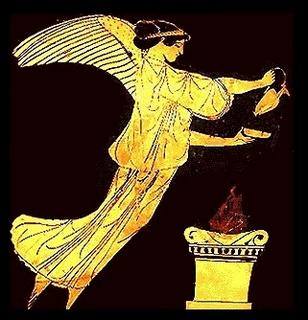Pridie Nonas September

Modern Date : September 4th
Pridie Nonas September
Day before the Nones of September
This is one of the dies comitiales (C), when committees of citizens could vote on political or criminal matters.
On this day in 57 BCE, after the senate had voted to restore him, Cicero entered Rome in triumph after returning from exile in Greece.
The last emperor of the West, a 16 year old with the unlikely name of Romulus Augustulus, abdicated this day to Odoacer, general of the German mercenary army. Odoacer became king of Italy, but was himself killed by other invaders.
The Greek poet Pindar was born on this day in 518 BCE.
September is the 'magical' seventh month (after March).
Mercury enters Virgo
Mercury finally escapes from Leo, where he's been "in fall" since late June, and enters the sign of his rulership in Virgo. His visit to his home is all too brief, lasting only until 9/20. It's best to handle brainwork and communications now, while the doctor is in, and bring them to culmination at the Full Moon of Sept. 17 - 18.
Niketeria
On the second day of the lunar month of Boedromion, the Greeks celebrated the goddess Nike, who is depicted as the winged victory. She was honored as a companion, or aspect, of Athena, and was the personification of victory. According to the poet Hesiod, she was the daughter of the Titan Pallas and the Oceanid Styx. Hesiod's Theogony features the following passage:
"Styx, the daughter of Okeanos, lay in love with Pallas
and in his mansion gave birth to Zelos and fair-ankled Nike,
and then she bore two illustrious children, Kratos and Bia."
Nike is therefore, according to Hesiod, the sister of three powerful siblings - Zelos (Rivalry), Kratos (Strength), and Bia (Force).
Despite her ancestry, Nike fought on the side of the Olympian gods against the Titans, and thus was considered a manifest representation of the victory of the Olympians.
This did not mean that Nike's powers were confined to the military sphere: quite the contrary, in fact, for she symbolized victory in many areas of ancient Greek life, including athletics (perhaps this is why the legendary shoe manufacturer borrowed the name of this goddess) and other contests.
Nike was called Victoria in Roman mythology.
Apache Sunrise
The Apache Sunrise ceremony marks a coming of age for pubescent girls. It is a four day long rite during which the girl becomes Changing Woman, a legendary Apache heroine who survived a great flood and magically gave birth to the Son or the Sun and Child of the Water. The ceremony ensures a long life for the girl and blesses observers.
